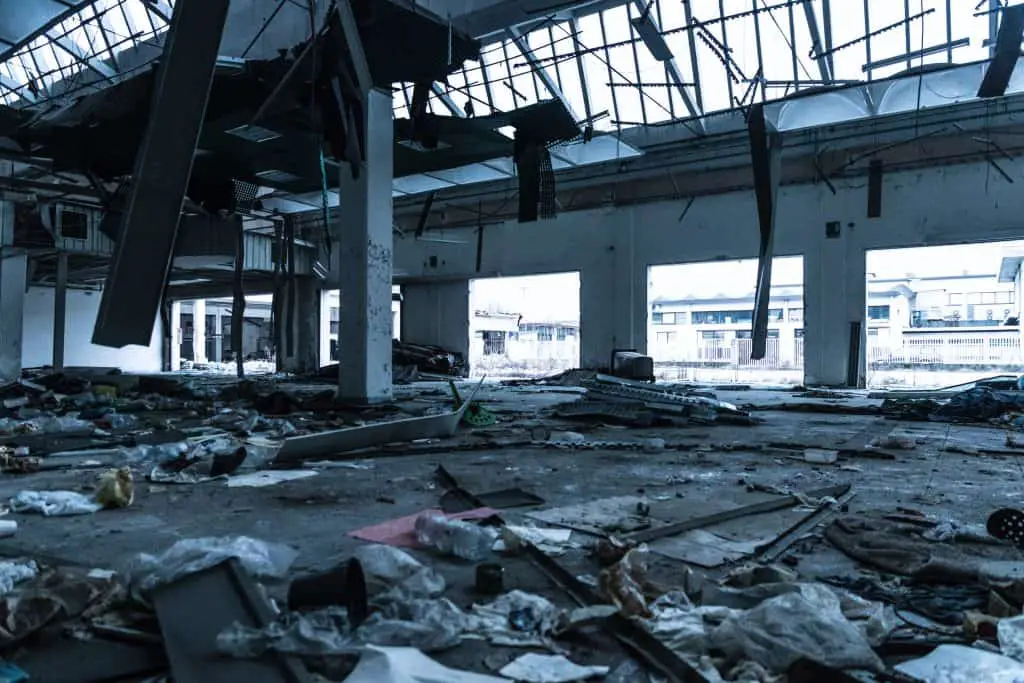Thanks to current events, the media, and television shows, more and more people are starting to learn about prepping. Many of those people ask themselves, “Is prepping pointless?”. Here is the answer:
Prepping is not pointless. Having plans and resources to deal with the emergencies you are most likely to face is a responsible way to keep yourself and your loved ones safe.
While I can understand why some people think that it may be pointless, there are far more reasons why I think prepping should have a place in peoples’ lives. Here are some reasons why prepping isn’t pointless as well as some reasons why people think that it is.
Reasons Why Prepping Isn’t Pointless
Okay, let’s start with the primary purpose of this article: to explain why prepping isn’t pointless. This section will address some common misconceptions that people have about prepping along with a few things that you may have not thought about.
Prepping Is About More than Just the Big Stuff

One reason why prepping isn’t pointless is that it is about more than just getting ready for big cataclysmic events. Things like EMP’s and nuclear war get a lot of attention. However, the truth is that most of the food and gear preppers set aside will be used during small scale or even personal emergencies.
The most effective form of prepping is one that helps you be more prepared for big emergencies but also makes your day-to-day life easier and more enjoyable. It is also customized to the types of emergencies you are most likely to face.
I have set up my own personal preps in this way. While I will continue to grow my preps to deal with large-scale emergencies, they are also geared to deal with things that are certain to happen to me and my loved ones.
Living in tornado alley means that my family and I will experience an active storm season in the spring. Even if our area isn’t hit by a tornado, we will almost certainly be affected by powerful thunderstorms. I have customized my preps to deal with the potential damage and power outages to accompany this weather.
As far as day-to-day preparedness goes, my EDC is set up in a similar way. It contains items that make my everyday life easier while giving me the tools that I would need to survive a really bad situation. Things such as flashlights and pocket tools can be used for both mundane purposes and during an emergency.
Take a look at How to Start Prepping: Begin Your Prepping Journey Today by clicking here.
Our System Is Fragile
One of the biggest reasons why prepping isn’t pointless is that the systems that we depend on to keep our world running are surprisingly fragile. These systems include how we get food and how we communicate with one another.
This fragility can be largely attributed to how complex these systems are and how heavily they rely on technology. In the past 100 years, advances in technology have allowed our economy to become globally interconnected. We can now purchase items from the other side of the world and have them delivered to us in days.
However, being globally interconnected comes with an inherent increase in complexity. Anything that is complex is going to be more vulnerable to disruptions simply because their are more things that could be disrupted.
As I am typing this, the world is experiencing first-hand how fragile our system is. COVID-19 is causing people to buy much larger quantities of certain items than they normally would. This increased demand alone is responsible for what many people perceive to be shortages.
The pandemic is also causing disruptions deeper within our supply chains. Workers at meat processing plants are starting to fall ill, which is reducing the amount of meat that the facilities can process. Some are even shutting down entirely if they have large numbers of cases.
Aside from a pandemic, there are many other things that could disrupt or even halt our system. Wars, natural disasters, and other events that seemingly affect just one part of the planet can send a ripple effect through the entire planet’s supply chain.
Prepping Gives You Peace of Mind
The peace of mind that accompanies prepping is another reason why it isn’t pointless. Knowing that you have plans and resources set aside to deal with emergencies can be a big confidence boost.
Even if a major disaster never happens, you can rest peacefully knowing that you have things in place to deal with them if they do. You will be able to deal with them according to a plan and not out of fear.
Being able to act logically during bad situations puts you way ahead of the curve. Human beings are the dominant species on our planet because we are the smartest. When we panic, that advantage is lost. Planning ahead reduces the chances that we will “lose it” and make a bad situation even worse.
You Will Probably Use Your Preps Anyway
Although some people think otherwise, there is a good chance that you will be able to make use of most of your preps, even if a large-scale emergency doesn’t take place. This is especially true if you do things like store foods that you already eat and purchase gear that is mulipurpose.
If you rotate your food storage properly, you probably won’t end up wasting a bunch of money by letting food spoil. Foods with a longer shelf life, like freeze-dried foods, could be used on hunting and camping trips if you have a surplus. They can even be passed on to a loved one if they are still unexpired.
Other things like toilet paper and sanitizing wipes will also probably end up being used at some time as well. Buying them now will also reduce the amount that you spend on them later. This is especially true when you take into account that prices for most products end up increasing a little each year.
Gear items, like weapons, water filters, and survival equipment can be used for recreation or other purposes. Survival equipment and weapons can find good use while hunting or camping. My family uses our Berkey water filter daily to remove the nasty “chemical swamp” taste from our water.
You can find my review of Berkey water filters by clicking here.
Natural Disasters Are Common

Another reason why prepping isn’t pointless is the widespread occurrences of natural disasters. While different parts of the world are subject to different types of natural disasters, no area is completely immune to them.
In fact, natural disasters are starting to happen more frequently. They are also becoming increasingly more severe. According to the Scientific American, from 1980-2019, the US saw, on average, 6.5 billion-dollar events each year. However, 2019 had over double that at 13.8 events.
Preparing for the natural disasters that are most likely to occur in your area makes a lot of sense. For example, if you live on the coast, planning for hurricanes is absolutely essential. In the midwest, snowstorms would be a much larger concern.
Historical Precedent
Another reason why prepping isn’t pointless is historical precedent. History is filled with disasters that no one saw coming. Pompeii was annihilated in moments while people enjoyed their baths. The unsinkable Titanic went to the bottom of the ocean on her very first voyage.
While most disasters affect smaller areas, that doesn’t mean that larger areas or even countries are exempt. Some of the world’s former superpowers, such as Egypt and Greece are mere shells of what they used to be. Even the mighty Rome fell after experiencing many eroding factors over a course of several years.
Things such as drought, famine, and war can bring even thriving areas to their knees. Economic downturns happen around once a decade. Events that can change people’s lives for the worse have been happening since mankind has existed. Unfortunately, these events are unlikely to stop in our lifetimes.
The Government Is Limited

Another reason why prepping isn’t pointless is that local, state, and national governments have limitations on what they can do during an emergency. Some of these limitations are spelled out by law while others are due to limits on funds or supplies.
Hurricane Katrina is a perfect example of how the government cannot help everyone during an emergency. Even though local, state, and federal governments devoted huge amounts of money and manpower, many people were still left to fend for themselves.
The situation in New Orleans was far beyond what the agencies of the time could deal with. Several years later, a similar situation occurred in Houston when it was flooded by Hurricane Harvey.
The past few decades have been full of situations where increasingly dire emergencies have exposed weaknesses in our government’s emergency management plans. We have plans in place, but nobody will be able to find all of their weaknesses until they are tested.
These disasters, as horrible as they were, only affected relatively small portions of our country. A disaster that is widespread, covering more than just a few cities or states, would easily overwhelm the agencies and resources meant to deal with them.
Because of this, being able to take care of your loved ones is imperative. While many government officials and workers will want to help, it is important to acknowledge the limitations that they operate under and understand that you could be on your own.
Continuity of Government and Prepping
When talking about private citizens’ relationship to the government during times of emergency, it is important to understand the purpose of continuity of government plans.
“Continuity of government” refers to the plans various levels of government, particularly the federal government, have in place to preserve itself. One example of this would be the presidential line of succession.
What makes prepping so important is that continuity of government plans are designed specifically to keep the government operational. They are not designed to keep private individuals, such as us, safe.
While the government will likely do things to save as many lives as possible, their primary goal will be self-preservation so that law and order can survive long-term.
The History Channel documentary Day After Disaster does a good job explaining how such continuity of government plans will work.
You Are Already Prepping Anyway
Another reason why prepping isn’t pointless is that you are already doing it, even if you don’t know it. The only difference is that in many cases, you are forced to by law.
If you own a car, then you are obligated to purchase insurance to cover, at a minimum, your liability should you have an accident. You are paying at least $1000 dollars a year on something that you hope you never have to use.
There are two differences between having insurance and prepping. The first is that prepping requires you to actively think about what you buy. An insurance policy on the other hand is usually withdrawn automatically each month or paid once or twice a year.
The other difference between prepping and having insurance is that most people have insurance while not many consider themselves preppers. Not wanting to be seen as “different” causes many people to not prepare for emergencies beyond what an insurance company can cover.
Why Do People Think Prepping Is Pointless?
Okay, here are some reasons why people think that prepping is pointless. I’ll also explain why I think each of these lines of thinking are flawed.
People Aren’t Aware of Threats

One of the most common reasons why people think that prepping is pointless is that they do not realize how fragile our way of life is. Most people in countries such as the United States have never lived in a world where they couldn’t get food from the grocery store or water from the tap.
Most of us live in a bubble. We go to work, eat, spend time with our family, and sleep. Disasters that are shown on the news seem a world away. This can be true even if the event took place across town.
Living in such a bubble has lured many people into a false sense of security. A perfect example of this how many burglars are able to gain entry to a target home through an unlocked door or window. According to a government survey, 40% of unauthorized entries into unoccupied homes were done through unlocked doors or windows.
That is just one example of how being unaware of threats can put people in danger. The same mentality makes people vulnerable at the gas pump while they are distracted by their phones. It also prevents people from taking steps to prepare themselves and their families for emergencies that could happen.
People Ignore Threats
Another reason why people think that prepping is pointless is that they ignore the threats that they do know exist. This could be because they don’t think they could do anything about those threats or they just prefer to remain “blissfully unaware”.
A perfect example of this is how many people don’t have even $500 in savings. They know that any unexpected event would have a big impact on their finances, but they do little to change it. While there are some people that would have great difficulty in fixing that, others don’t simply because they don’t want to change their spending habits.
A lot of people deliberately choose not to think of the things that could threaten them and their loved ones because it stresses them out. Unfortunately, this often results in far worse, and in many cases, longer-term stress than simply dealing with the problem would have caused.
People Think “It Could Never Happen to Them”
One common belief that most people share is that nothing bad will ever happen to them. We seem to think that because we are “just us” that nothing extraordinary (good or bad) will ever happen.
This line of thinking is flawed. Extraordinary things, whether they are good or bad, happen to normal people every day. Some of the richest people in history were regular men and women until they hit a lucky break or their hard work paid off. On the other hand, extraordinarily horrible things have happened to regular people doing normal things like sleeping in their homes or working in their office.
While certain things are statistically unlikely to happen to us, completely ignoring the possibility of them happening is dangerous. When it comes to prepping I would much rather “have it and not need it than need it and not have it”.
They See Preppers as Crazy
Another reason why people think that prepping is pointless is that they think preppers are crazy. Unfortunately, this feeling isn’t entirely without merit. This is partly because of how preppers have been portrayed in popular culture.
Many television shows, movies, and news outlets have portrayed preppers as paranoid and antisocial. If you see a prepper in a movie or tv show, many times they are the villain, like in 10 Cloverfield Lane, or some sort of comic relief like Marvin in Red.
This has resulted in many people viewing preppers as fringe lunatics that they don’t want to be associated with. However, not every prepper is like this. Most preppers have jobs and families. They take their kids to sports and may even be a volunteer coach for their kids’ sports teams.
The reason why the media doesn’t show those types of preppers is that they aren’t nearly as interesting as the crazy nut job who drinks his own pee. Also, many normal preppers don’t advertise that they are one.
There are two reasons why many preppers choose to remain anonymous. The first one is they want to avoid ridicule. The second is they understand that, during an emergency, they could become a potential target for looters or even people the know who have become desperate.
What if Nothing Bad Ever Happens?
Another reason why people think prepping is pointless, and as a result, don’t do it is they ask themselves, “What if nothing bad ever happens?”. They feel that their money and effort will be wasted if there isn’t some huge cataclysmic event that wipes out mankind.
This won’t be a problem if you prep the right way. If you set up your preparedness plan in such a way that it is relevant to your everyday life, you will be able to prevent most of the waste that results from narrow-sighted prepping.
Prepping can also be a gateway to many rewarding hobbies and activities. Things such as gardening, hunting, and even carpentry all have a place in a prepper’s bag of tricks. While you can’t learn everything, picking up a new skill that you enjoy using is a good way to prevent all of your prepping efforts from going to waste.
To learn about the mistakes that preppers make and how to avoid them, click here.
You Can’t Prepare for Everything
A big reason why some people think that prepping is pointless is that you can’t prepare for everything. While that is true, preparing for the things that you can control is logical. Willfully not preparing for what you can, on the other hand, is defeatist.
Think of it like this: You have 30 horses and one of them escapes. Do you A.) Close the gate so no more horses escape, or B.) Leave the gate open because you have already lost one horse anyway?
Most people will agree that Option A is a better choice. Even though you may have lost one horse, that doesn’t mean that you have to lose all 30.
Prepping is very similar to this. I may not be able to do anything to protect myself if a nuke lands on my head as I’m typing. However, that doesn’t mean that I shouldn’t do things that could help my family through something more realistic, such as a tornado.
